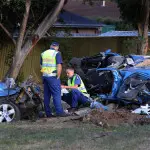 The Coroners Court is a specialist court that investigates, hears evidence and delivers findings about the causes and circumstances of deaths. Coroners are independent officials of the Crown who oversee this process. There are Coroners and Coroners Courts in all Australian States and Territories. In most jurisdictions, the Coroners Court is overseen by a State Coroner, who is appointed by the State governor on the advice of the government of the day. In Victoria, the State Coroner must be a County Court judge. Coroners themselves must be magistrates with qualifications to preside in the Magistrates’ Court. A magistrate can be assigned to serve exclusively as a coroner or to fulfil the duties of a coroner temporarily. If demand for coroners is heavy then experienced lawyers can also be seconded as coroners, though this is uncommon. Coroners, their jurisdiction and responsibilities are defined by the Coroners Act (Vic, 2008) which came into effect in November 2009.
The Coroners Court is a specialist court that investigates, hears evidence and delivers findings about the causes and circumstances of deaths. Coroners are independent officials of the Crown who oversee this process. There are Coroners and Coroners Courts in all Australian States and Territories. In most jurisdictions, the Coroners Court is overseen by a State Coroner, who is appointed by the State governor on the advice of the government of the day. In Victoria, the State Coroner must be a County Court judge. Coroners themselves must be magistrates with qualifications to preside in the Magistrates’ Court. A magistrate can be assigned to serve exclusively as a coroner or to fulfil the duties of a coroner temporarily. If demand for coroners is heavy then experienced lawyers can also be seconded as coroners, though this is uncommon. Coroners, their jurisdiction and responsibilities are defined by the Coroners Act (Vic, 2008) which came into effect in November 2009.
The Coroner receives notification of all deaths, though only a small proportion are investigated. Most deaths occur from natural causes, such as a heart attack or stroke; or from a known or existing medical condition, such as cancer. In these cases a medical examiner (usually the deceased person’s physician) notifies the coroner and submits a death certificate, explaining the causes of death. Deaths that are sudden, violent or cannot be easily explained are known as reportable deaths. If the person has died in an accident, from the violent acts of another person or from the deceased’s own actions or misadventure, it is considered a reportable death. Deaths that occur in custody or institutional care, or during a medical or surgical procedure, are also deemed to be reportable. So too are deaths where the identity of the deceased is unknown, such as the discovery of an unidentified body.
Where a death is reportable, the Coroner will confiscate and hold the remains (in other words, the corpse will not be released for burial) and order further investigation. The body may then be inspected visually, for cuts, marks, bruises or abrasions. The Coroner may also order the collection of fingerprints, biological matter (blood, saliva, mucus and DNA) or other evidence (skin and fingernail swabs) for forensic testing. In some cases medical imaging such as CT scans, ultrasounds and X-rays may be conducted. If the cause of death is still inconclusive, the Coroner may order an autopsy (a surgical examination of the body by a pathologist). Relatives who object to an autopsy being performed can do so in writing to the Coroner, or by seeking a Supreme Court order halting the autopsy. In most cases, however, the Coroner’s order will stand, particularly if the death is suspicious or the result of violence.
The vast majority of coronial cases are resolved by the Coroner’s preliminary investigations. In some cases, however, an inquest may be deemed necessary by the Coroner. An inquest is a judicial inquiry into the causes and circumstances of death. Inquests can be conducted for a single death, or for multiple related deaths (such as the deaths of several people in the same traffic accident, bushfire or epidemic). Inquests are conducted in a courtroom-like facility and are open to the public and the media – however unlike court hearings, there is no fixed procedure or rules of evidence, so the Coroner largely determines how the inquest should be run. Witnesses appear at an inquest, either voluntarily or by summons; they are sworn in and their testimony is recorded, as in a conventional court. Any ‘interested party’, such as a relative of the deceased or someone with relevant information, can appear as a witness or submit written statements to the inquest. After hearing witnesses and reviewing other evidence, the Coroner will make a finding. The finding is a formal decision that states the identity of the person, the cause of their death, the time and place where death occurred, and any relevant circumstances which preceded or contributed to their death.
Once the Coroners Court has made its finding, a copy of the finding is distributed to interested parties, including the next-of-kin of the deceased person(s), the police or insurance companies. An interested party can appeal a Coroners Court finding to the Supreme Court, provided they do so within six months from the date of the finding. The Coroner can, in connection with a finding, make recommendations to the government or its departments. These recommendations often suggest punitive action, such as the laying of criminal charges or investigation into the professional conduct of medical workers. But Coroners can also make recommendations about changes in law, policy or procedure, to prevent similar deaths in future.
© lawgovpol.com 2014. Content on this page may not be republished or distributed without permission. For more information please refer to our Terms of Use.
